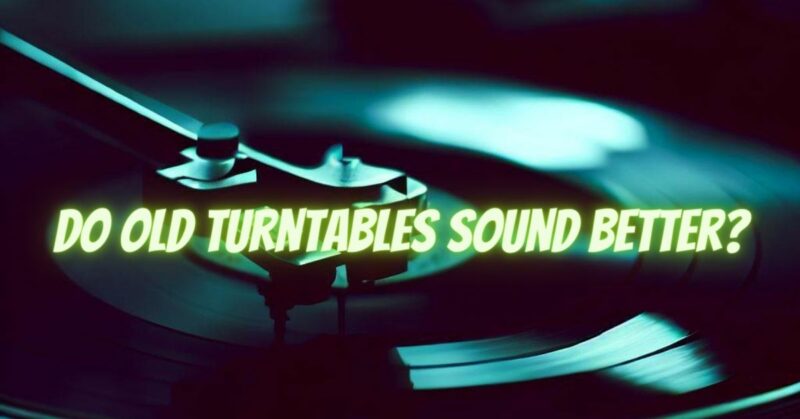The debate over whether older turntables are superior to modern ones in sound quality has been a subject of discussion among audiophiles and vinyl enthusiasts for years. Some argue that vintage turntables possess a certain charm and character that modern counterparts lack, while others contend that modern advancements in technology have led to superior audio performance. In this article, we will explore the factors that contribute to sound quality in turntables and debunk the myths surrounding the vintage vs. modern turntable debate.
Analog Sound and Vinyl Appeal
One of the main reasons vintage turntables are often associated with superior sound quality is the analog nature of vinyl playback. Analog sound, generated by the mechanical vibrations of a stylus tracing the grooves of a vinyl record, has a unique and warm character that many audiophiles appreciate. This inherent warmth and nostalgia can lead to a perception that vintage turntables offer a more authentic and pleasing listening experience.
Quality of Build and Materials
Older turntables were often built with high-quality materials and craftsmanship, contributing to their durability and potential longevity. Many vintage turntables were constructed using heavy, dense materials like wood and metal, which can aid in reducing vibrations and resonance, resulting in a cleaner sound. However, modern turntables can also be made with high-quality materials and precision engineering, leading to comparable sound performance.
Advancements in Turntable Technology
Modern turntables have benefited from significant advancements in technology and engineering. Manufacturers have developed innovative designs, improved motors, and utilized high-quality components to achieve precise speed stability and accurate tracking. These advancements have led to modern turntables capable of producing outstanding sound quality, rivaling or even surpassing some vintage models.
Upgrading Components and Customization
Both vintage and modern turntables offer opportunities for customization and upgrades. Vinyl enthusiasts can enhance the sound quality of their turntables by upgrading components such as cartridges, tonearms, and phono preamps. Many modern turntables are designed to be modular, allowing users to tailor their setups to their preferences and achieve their desired sound characteristics.
Record Condition and Source Material
The condition of the vinyl record itself plays a significant role in sound quality. Records that are well-preserved and properly cleaned will yield better results on any turntable, whether vintage or modern. Additionally, the source material, mastering, and pressing quality of the vinyl record can have a substantial impact on sound quality, regardless of the turntable used.
The debate over whether older turntables are superior in sound quality is subjective and depends on various factors. Vintage turntables may offer a nostalgic appeal and a unique analog warmth, but modern turntables have benefited from significant advancements in technology, engineering, and materials. Ultimately, the sound quality of a turntable is influenced by factors such as the quality of build, components, source material, and condition of the vinyl records being played.
Whether you choose a vintage turntable or a modern one, it’s essential to focus on factors that contribute to sound quality and your personal listening preferences. Both vintage and modern turntables can deliver exceptional sound performance, and the enjoyment of vinyl playback should be based on individual taste and appreciation for the unique qualities that each type of turntable brings to the listening experience.


